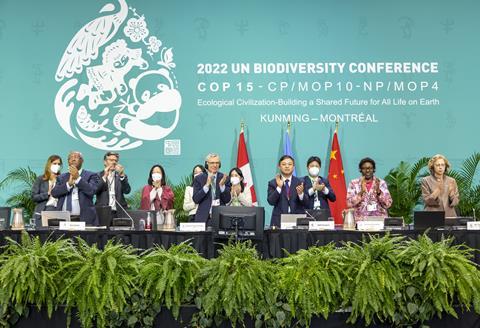The Convention on Biological Diversity (CBD) hosted the second half of its 15th conference (COP15) in December 2022 in Montréal, Canada. It was organised under the Presidency of the People’s Republic of China and is the biodiversity equivalent to the UN climate change conferences hosted by UNFCCC. The PRI attended COP15 alongside a delegation of 34 signatories to elevate the financial sector’s voice and unpack the relevant developments for investors.
The Kunming-Montreal Global Biodiversity Framework
The adoption of the Kunming-Montreal Global Biodiversity Framework marks a historic moment for the conservation and restoration of nature. Adopted by 196 countries under the UN Convention on Biological Diversity, the agreement commits the world to take action by 2030 to halt and reverse biodiversity loss, and as part of this conserve at least 30% of land, freshwater and ocean globally, whilst repecting the rights of indigenous peoples.
PRI particularly welcomes the call to align global financial flows with the goals and targets of the framework, the ask for large and transnational companies and financial institutions to assess and disclose their risks, dependencies and impacts on biodiversity and the intent to eliminate, phase out or reform harmful subsidies on biodiversity by 2030. However, to ensure successful implementation, it will now be essential that countries deliver on the Agreement, by translating it into national plans and policies and ensuring the efficient mobilisation of resources.
Tamsin Ballard, Director of Climate at the PRI, commenting on the outcome of negotiations at COP15

Adoption of the Kunming-Montreal Framework at COP15, 19th December, 2022 (photo courtesy of the Convention on Biodiversity)
What is COP15 and why did it matter?
The UN Biodiversity Conference (COP15) took place from 7th-19th December 2022 in Montréal, Canada following a two-year postponement due to COVID-19. Nature and climate are two sides of the same coin. COP27 and its biodiversity equivalent COP15, played important roles in advancing policy responses to the climate and nature crises, and providing clarity for the private sector on global goals and pathways for action. COP15 brought to a close the negotiations for a post-2020 Global Biodiversity Framework, which commits the world to take action by 2030 to halt and reverse biodiversity loss, with a vision of living in harmony with nature by 2050.
Climate change and biodiversity loss are inextricably linked challenges, which present systemic risk for investors. PRI recognises the important role investors can play in addressing these twin crises and supporting a sustainable future.
David Atkin, CEO
COP15 concluded the negotiations for a post-2020 Global Biodiversity Framework, which commits the world to take action by 2030 to halt and reverse biodiversity loss, with a vision of living in harmony with nature by 2050. Many parties and stakeholders (including the private sector) called for an ambitious post-2020 Global Biodiversity Framework that would set the necessary global targets to support future action from policymakers, corporates and investors. This included consideration of commitments and actions to ensure alignment of public and private financial flows and policy frameworks to deliver those targets.
Climate and nature are intrinsically intertwined – climate change is a key driver of biodiversity loss, while deforestation accounts for 11% of global greenhouse gas emissions. Nature also has the potential to provide one-third of the necessary solutions and further build systemic resilience to adverse climate impacts, if implemented rapidly and at scale. PRI has encouraged investors to join the dots between the COP27 (UNFCCC) and COP15 (CBD) and to adopt a holistic approach in tackling the twin challenges of climate change and biodiversity loss. Some positive progress was made at COP27 this year with the term ‘Nature Based Solutions and ecosystems approaches’ making it into the ‘COP27 Cover Decision’ (a short document outlining the main outcomes of negotiations that member states wish to highlight).
To gain more understanding of the CBD, COP15 and the push for an ambitious post-2020 Global Biodiversity Framework, access the Financial Sector Guide for the Convention on Biological Diversity, developed by PRI in collaboration with the CBD, UNEP FI, Business for Nature, and Finance for Biodiversity Pledge.
The PRI’s role at COP15
Participating in COP15 allowed the PRI to highlight the growing importance of tackling nature and biodiversity loss to manage financial risks and enhance returns. We also promoted the private sector’s call for an ambitious post-2020 Global Biodiversity Framework that creates the clarity and action to align all economic actors, including finance, to halt and reverse nature loss, and contribute to Nature-based Solutions to climate change, a fair and just transition, and other sustainable development challenges.
Key highlights and relevant resources:
- Pre-Cop15 webinar: PRI, UNEP FI, and the Finance for Biodiversity Foundation hosted a pre-COP15 webinar explaining the relevance of the conference for the financial sector. The recording is available to view.
- Investor statement: 154 financial institutions (USD 24.8 trillion AUM) signed the “Moving Together on Nature” statement drafted by UNEP FI, PRI and the Finance for Biodiversity Foundation to showcase the appetite of the private financial sector for an ambitious global biodiversity framework. Read more in our press release.
- PRI delegation: To attend COP15, investors had to be part of the delegation of an organisation qualified in biodiversity conservation. PRI co-ordinated a delegation of 34 signatories and members of its Climate and Environment and Canada teams.
Still to come:
- Post-Cop15 thought-leadership: Look out for the joint PRI and UNEP FI thought-leadership piece in early 2023 on the implications of the final post-2020 Global Biodiversity Framework for the financial sector, translating the outcomes of the negotiations for signatories.
Future PRI work
PRI is currently developing a Resilient Natural Systems programme, as a continuation and broadening of its previous work on Sustainable Commodities (focused on deforestation) and Biodiversity. This will include the development of a collaborative engagement programme on Resilient Natural Systems with an initial focus on forest loss and land degradation.
Additional resources
Additional relevant resources can be found below. To further join the dots between climate, nature and biodiversity, you can look at the key themes from COP27.












